
Saturday August 12, 2017
By Mila Koumpilova
By Mila Koumpilova
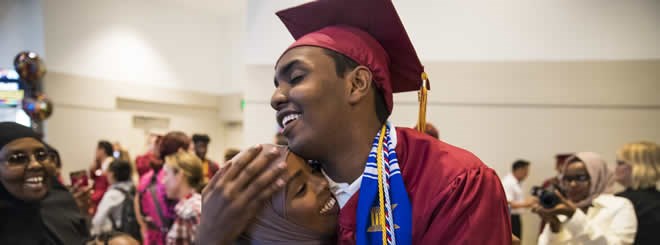
Mohamed Hassan hugged his older sister as he was surrounded by family members after his graduation ceremony on June 8, 2017 in Minneapolis, Minn. Photo by Renee Jones Schneider, Star Tribune
Mohamed Hassan feels his panic rising as he strolls on a hushed University of Minnesota campus one brilliant summer afternoon.
In just a few weeks, the stately columned halls he passes will be teeming with students. In their midst, he’ll have to face head-on the questions that dogged him this past year as he tackled and almost bungled applying to college, that American rite of self-discovery. What should he become? Can he handle college? Should he even be there?
Mohamed has felt many eyes on him on this journey. He knows the story line: An immigrant kid, egged on by his family’s high expectations and cheered on by well-wishers, forges a path to the good life. But he also feels under a new scrutiny as a newcomer to this nation of immigrants, caught up in a debate rife with labels that strain to capture him: Black. Muslim. Somali refugee.
On the cusp of adulthood, he says, “You can never be certain if you quite measure up.”
In October at Roosevelt High in Minneapolis, 17-year-old Mohamed stares at the all-important personal essay that will sell him to college admissions officials. He opens with a long passage about the immensity of the universe.
He knows he is dodging the subject, surrendering way too few personal details. But he hates advertising himself. With a slouch curbing his almost 6-foot frame and hands tucked in his hoodie pockets, he shuns the spotlight.
Is Islam supposed to define him? That’s what some politicians seem to think, but it’s not so simple. In his weekly Islamic studies class, Mohamed takes diligent notes, but next thing he knows, his mind has wandered off to a girl he likes. His mom begs him to pray more. He says he wants to be “casual” about religion, yet unbeknownst to her, he weaves quotes from the Qur’an into school essays.
It seems most Somali young men in today’s headlines are those trying to join the Islamic State. Surrounded by stereotypes of submissive Muslim women and menacing Muslim men, he is a mild-mannered guy in a household of take-charge women.
Mohamed needs to portray himself as a strong college candidate. But is he? He scored 30 on the ACT, one of the highest scores at Roosevelt, and he has racked up college credit at Minneapolis Community and Technical College. But his botched freshman year still weighs down his GPA. He tells a friend, “I am kind of a slacker, so the challenges will be a lot challengier for me.”
Should he focus on his plan to become an engineer, the one his mom supports? The choice baffles his principal. From a famously oral culture, Mohamed is a bookworm, his essays flecked with poetry.
Mohamed Hassan took a selfie with friends at an after school hang-out at Roosevelt High School in Minneapolis, Minn., on December 2, 2016. Renee Jones Schneider
A mother’s dream
Mohamed’s mom strides into Roosevelt’s College Knowledge Night that October on a sprained ankle and a crutch, her bright purple head scarf wafting with her momentum. Her urgency about her kids’ futures propels and sometimes paralyzes Mohamed. She hobbles up three flights of stairs to a session for seniors’ parents, waving off a teacher who calls: “You can teach that class. You know that, right?”
Amino Farah arrived in Minnesota with eight children. She set shampoo bottles onto a conveyor belt in north Minneapolis for $5.15 an hour, sent there by a welfare official. Later, she worked the night shift loading trucks, getting four hours of sleep during the school day. Mohamed’s stepdad, whom Amino married while awaiting resettlement, rejoined the family years later, but only for short stints. Amino’s youngest was born here; her eldest arrived from Africa.
Amino doesn’t dwell on all the civil war took from her: a comfortable life in Mogadishu and Mohamed’s father. She doesn’t want that back story weighing down Mohamed.
Now a part-time personal care assistant, Amino is “the mom of Roosevelt.” She spends hours in the counseling office working out challenging schedules for Mohamed and two younger brothers but never plays lawyer for her sons.
Loyal to the school despite the move to Columbia Heights, she crisscrosses the city in a blur of pickups and drop-offs. In quiet moments waiting in her van, she reads an Ohio cleric’s books telling Somali moms how to steer kids away from drugs, gangs and radicals: Shut out the clannish divisions of the old land. Keep fathers with the family.
Two of her boys she couldn’t shield. A brother just a year older than Mohamed cycled in and out of juvenile detention in Red Wing. Another racked up his own rap sheet: DWI, theft, robbery. Mohamed knows that when she can’t sleep, choked up with anguish over those boys, she reminds herself that she has him and his older sister Fardowsa. Fardowsa, a doctor in the making. Mohamed, a future engineer, an example for his younger brothers.
“I have a dream,” she tells him. “I am waiting my dream.”
Leaving high school cocoon
Mohamed is gearing up to watch President Trump’s inauguration on his cellphone in the raucous cafeteria at Roosevelt, where “Everyone is welcome here” signs sprouted that morning. At a table with his brother Ali’s friends — a mix of white, black, Latino and Asian juniors — Mohamed expounds on how Trump carved a path to victory.
Mohamed and his sister Fardowsa are both politics wonks, but of different breeds. On election night, Mohamed dispensed punditry and jokes about landing on “the first boat back to Africa.” Fardowsa, a U double major on a full ride, fled from the TV screen to study, all the talk of Muslim registries and bans raising the stakes for her and her siblings.
Mohamed shrugged off the president’s remarks that Minnesota has suffered enough from Somali refugees. Every immigrant group gets beat on, he says philosophically: “It’s not really a melting pot but a pyramid where the only way to claim your place is to bash those who came after you.”
But to Fardowsa, it’s all personal. At Roosevelt, she wore the full face veil, its eye slit sharpening her focus on school and faith. She never saw herself as anything other than a regular teen growing up in Minnesota — until now. Now, she helps craft the Muslim Student Association’s response after somebody sprays “ISIS” over the group’s mural.
Mohamed is sheltered in Roosevelt’s heavily immigrant cocoon, she tells him. The outside world will judge and fear him. She buys him a U hoodie, the closest thing to a shield.
An engineer or a lineman?
Two after-school programs battle for Mohamed’s allegiance with sometimes conflicting messages.
College Possible seeks to usher him to a four-year diploma. His “coaches” try to keep him on task, even as he lets a string of college application deadlines slip by. They pitch in when he files his U priority application hours before the November deadline, only to realize the supporting materials are due within the week.
Then, there’s Legacy, a new program at Roosevelt. For Xcel Energy and other corporate sponsors, it offers a pipeline for the minority job candidates they crave. It helps students map out a path to the careers they choose.
Mohamed goes on a field trip to learn about line worker jobs. Legacy founder Deon Clark says for some students, a certification program is a better bet than four years of college without a plan: a well-paying job in months, and maybe later on, evening classes toward an engineering degree, with Xcel chipping in.
“True power is when you have options,” he says.
For Mohamed, Clark is a made-to-order father figure. A U.S. Navy vet and former energy human resources pro, he has a similar back story: a strong single mom, government aid, siblings doing time. In twice-weekly meetings, he pushes Mohamed to do something both scary and momentous: Begin to untangle the contradictions of his coming of age, out loud, to an audience of mostly immigrant kids, “wannabe assimilators” like him.
But his options dim when a letter arrives in January: He is wait-listed at the U’s College of Science and Engineering.
“You’ve let everybody down,” Mohamed tells himself over and over.
A moment of clarity
To Mohamed, the world outside the Roosevelt cocoon looks different now, darker. He might not leave high school as a college-bound striver after all, but as another refugee kid, rudderless and exposed.
He tallies hate crimes. Trump’s order pausing Somali arrivals would have stopped Amino, not the 9/11 hijackers, he rails, and rushes to renew his passport, just in case.
He thinks about the Xcel line worker program. Yes, he is college material, and he’s afraid of heights. But he imagines his oldest brothers’ blue-collar lives — a cabdriver and a security guard — jobs that would solve the uncertainties of life after high school.
Then, Mohamed is thrown a lifeline, and he grasps it. That February, a Roosevelt counselor intervenes with the U’s admissions rep. The rep says Mohamed could probably get into the College of Liberal Arts, if he can explain his freshman-year grades.
Mohamed starts writing. This time, there will be no hiding behind the vastness of the universe.
Instead, he writes about how freshman year unnerved him with the tougher demands of high school and visits from police officers looking for his older brothers: “At school, I pretended that everything was okay, and at home, I felt like a prisoner, with no way out.” He writes about a numbness he can now name: depression.
“I’ve learned to deal with life better,” he writes. “I learned to go with the flow, accepting life’s slings and arrows and dealing with them rather than ignoring them.”
In March, another letter arrives: The U’s College of Liberal Arts accepts him. Later, so does the College of Food, Agricultural and Natural Resource Sciences, which has a biosystems engineering program. Federal grants and scholarships will cover most of the tab.
Mohamed drops the line worker idea: It was not for him.
He arrives at June graduation with what feels like a hard-won sense of clarity. A few minutes before the ceremony, Roosevelt’s principal asks if any students want to give an impromptu address. In astonishment, Mohamed watches himself walking to the lectern, where thunderous applause greets him. The memory he shares about freshman year’s anti-tardiness campaign draws chuckles. Then he turns serious, talking about how much they’ve all grown up.
“I would have never thought I would be up here talking,” he says. Exhilarated, he thinks, “I can get used to this.”
A new kid on campus
In August, Mohamed stops by campus to set up an appointment with his academic adviser. It’s a hot day, but he wears his U hoodie, with the red “M” emblazoned across the chest. A receptionist peppers him with more questions he can’t answer: His student number? His major?
Mohamed faces new self-doubt. At freshman orientation, he saw mostly white kids and wondered if he’ll fit in. But this place has accepted him, he reminds himself, even if he remains on a wary mainstream’s waiting list.
He can learn to embrace the questions awaiting him this fall: Instead of an engineer, should he become a writer?

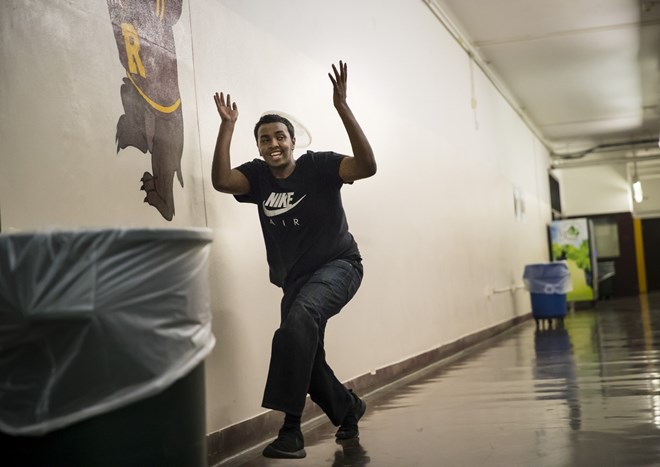
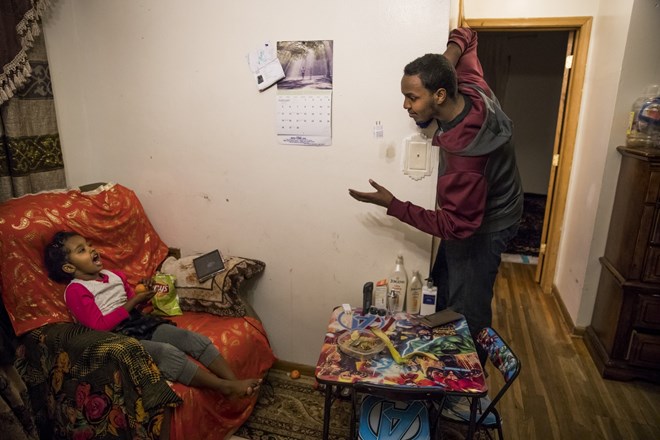
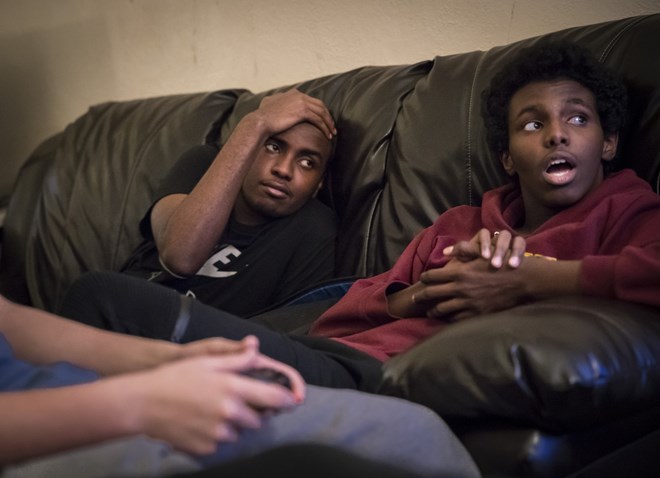
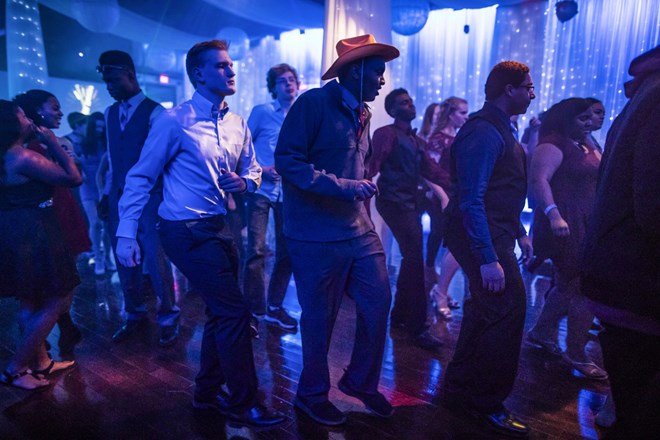

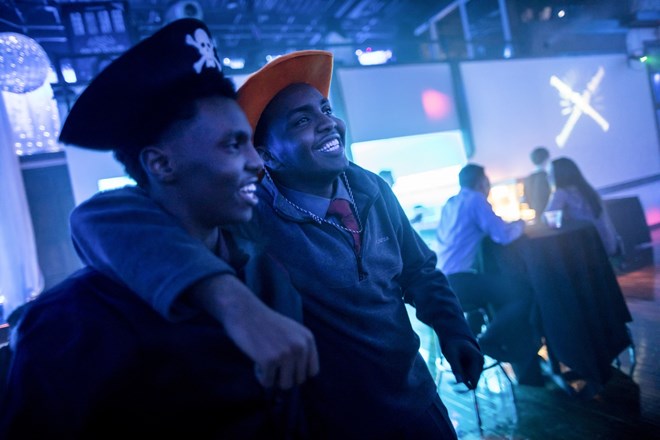

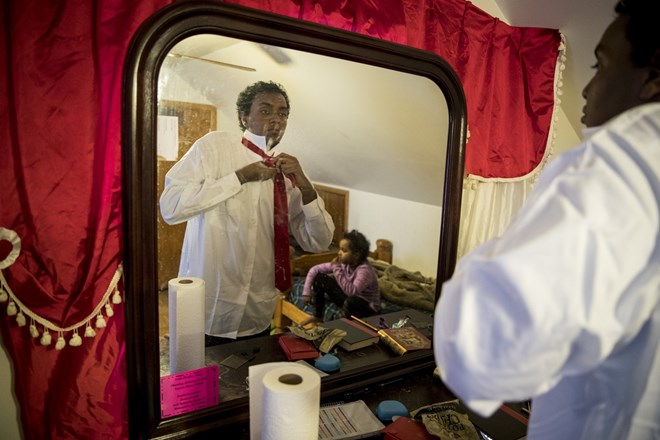
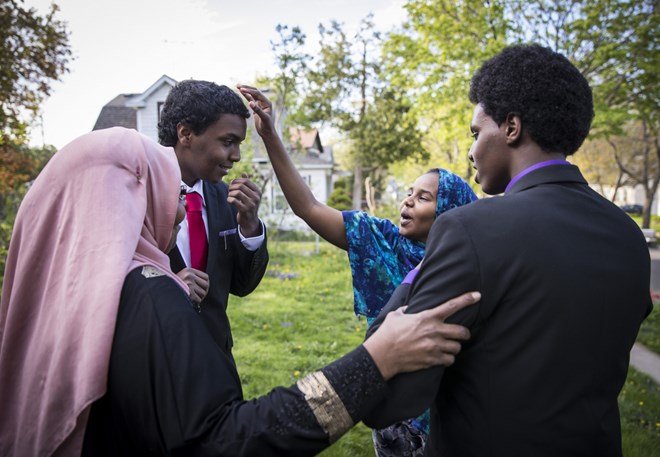
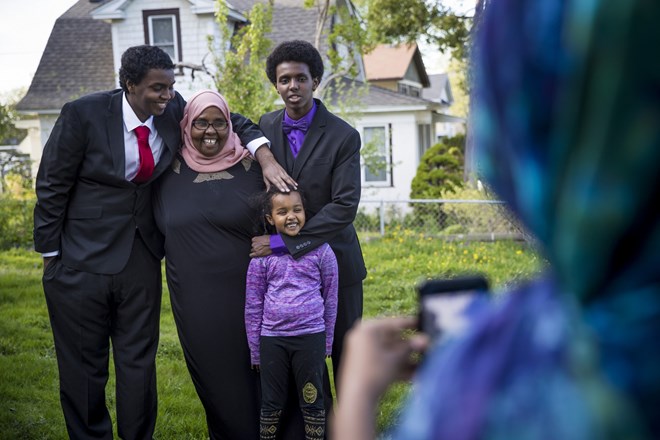
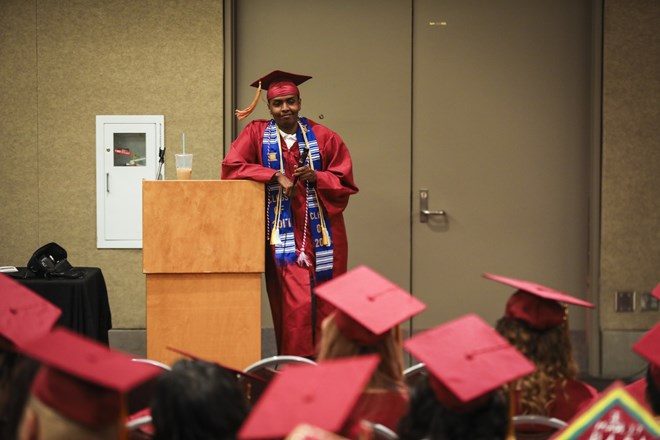
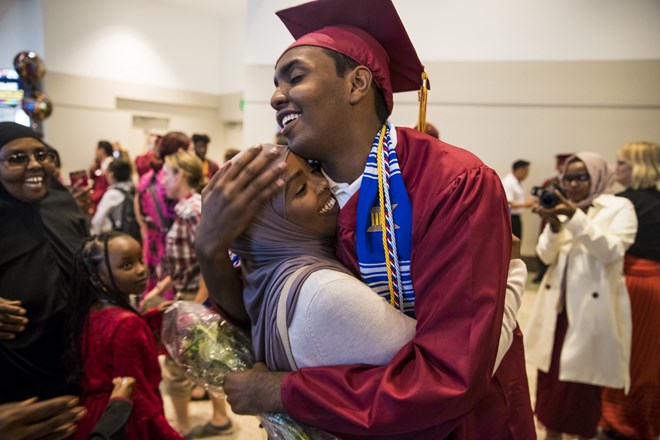
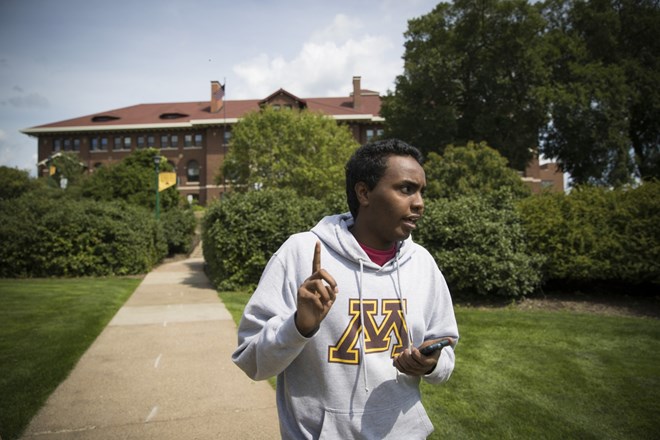

No comments:
Post a Comment